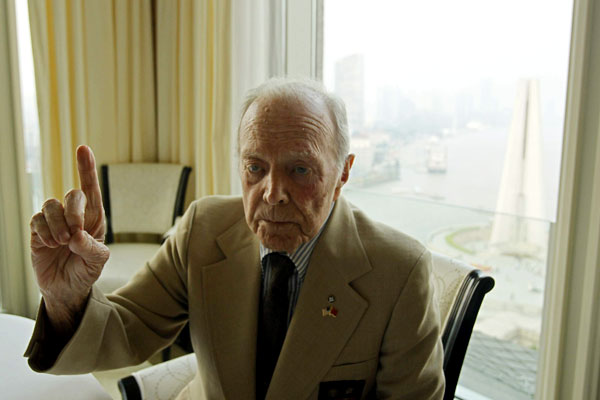Veteran fighter pilot retells nerve-wracking stories
 |
|
Peter J. Goutiere, 98, shares his heart-wrenching World War II experiences serving as a pilot, on his most recent visit to Shanghai. Yong Kai / China Daily |
It has been more than six decades, but American pilot Peter J. Goutiere could still remember the details of every narrow escape he experienced between 1942-45, which adds up to 680 times.
Related: Downtrodden route
He was one of the thousands of fighter pilots who had flown cumbersome cargo planes loaded with war supplies on one of the world's most hazardous air routes over the Himalayan Mountains during World War II.
"There were quite a few stories (to tell)," the 98-year-old tells China Daily, on his most recent visit to Shanghai. His tone is casual and gentle. It's like how a grandfather sounds when retelling childhood anecdotes to a grandchild. But his eyes are as sharp as those of an eagle and his mind is alert.
In the spring of 1942, during the War of Resistance against Japanese Aggression, the Japanese forces cut off the last important land route of Chiang Kai-shek's armies, then the governing body of China, by blocking the Burma Road.
As an ally, the United States Army Air Forces offered to create an airlift above the China-Burma-India (CBI) Theater over the stormy Himalayan. The air route was later called "the Hump" because of the physical feature of the mountains, which posed great difficulties for pilots, already in dearth of radio aviation aids, weather information and flying experience in that area.
Despite the considerable amount of supplies transported to China, about 650,000 tons of supplies, about 1,000 men and 600 aircraft were lost over the 853-km-long passage throughout the 42 months, the CBI website says.
"We were losing people and planes every week. Sometimes, the guy you had breakfast with just never returned," Goutiere recalls.
Other times, the captain, as well as his Hump mates, had to fly above all the wreckage of the crashed planes glittering in the sunlight, or witness the whole process of a good friend being killed, and couldn't do anything to help. That was what happened to his friend, Jim Fox.
"Once, we were flying back to our base when a big storm came suddenly - snow, ice and rain. I could just see him (Fox) for one minute, and the next thing, his left wing hit the mountain, and it crashed."
Apart from the complicated geographical features of the mountains and the strong Japanese forces who could destroy 25 planes in 30 minutes, Goutiere says the other biggest enemy for them was the weather, which could be "zero weather", referring to the limited visibility and the low temperature.
"When it goes above 10,000 meters, things are very different. The strong turbulence could play your vehicle like a toy. And the water vapor could easily freeze your engines and wings. You had to be very careful, or you'd never come home," he says.
But the son of a British police superintendent born in colonial India believes that fear is the last thing that can win battle.
"Like anything, the more you talk about it, the more frightened you could be. It's like riding a horse - if you don't control it, it's gonna knock you off the saddle. Even if you use a typewriter, you need to practice," he says, speaking at the Rosamonde Aviation Lounge in the Peninsula Hotel in Shanghai, which is named after the first plane designed and built in China.
Goutiere says he originally wanted to be a historian but encountered a "life-changing" opportunity when the American government was selecting some college students for a pilot training program.
This is Goutiere's fourth visit to China. He came this time to celebrate the opening of the China National Aviation Corporation museum in Beijing.
Previous visits include a trip to the airfield that Goutiere had spent the "most unforgettable years" of his life in Kunming, Yunnan province, in 2005.
xujunqian@chinadaily.com.cn






















